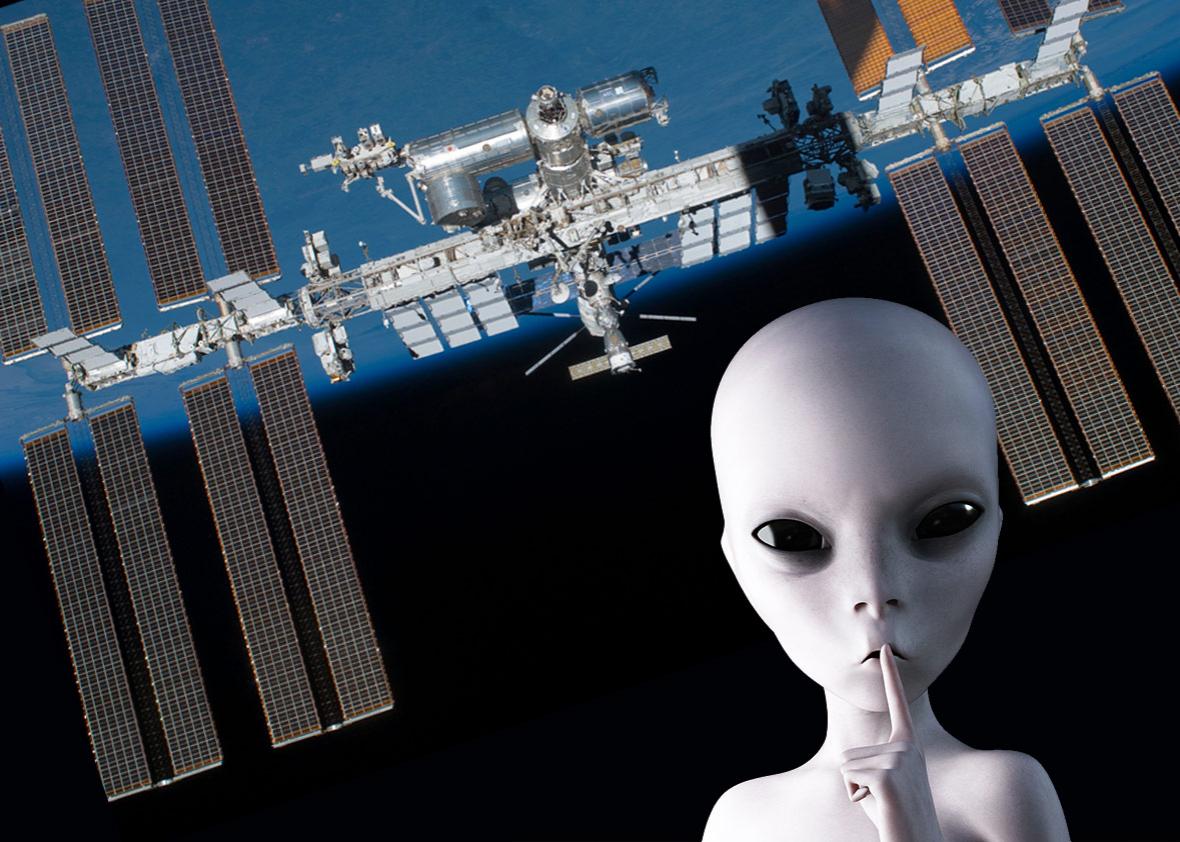A surprising number of people believe we already have proof aliens exist. But it’s very rare when that segment of the population overlaps with the segment that’s actually been to outer space. And yet, on Monday, Anton Shkaplerov, a Russian cosmonaut who has already spent two stints aboard the International Space Station and is gearing up for a third mission to launch on Dec. 18, told Russian state media that scientists have found living bacteria sitting on the exterior of the Russian segment of the ISS. He claims the bacteria is not from Earth—it’s extraterrestrial in origin.
According to Shkaplerov, cosmonauts aboard the ISS swabbed the hulls of the station during spacewalks, particularly in areas where fuel wastes were discharged and in obscure parts of the station’s surface where activity is low. Those samples were sent back to Earth for study, and, as Shkaplerov told the Russian media, “now it turns out that somehow these swabs reveal bacteria that were absent during the launch of the ISS module. That is, they have come from outer space and settled along the external surface.”
Shkaplerov goes on to say that this extraterrestrial bacteria has so far posed no danger and that it has been found to be distinct from other terrestrial bacteria also found on the ISS exterior. (That bacteria likely arrived via tablet PCs brought to the station.)
So is this evidence of aliens? I don’t think so. It’s unclear when or why these bacterial swabs were taken, or who has been studying them, or for how long. When asked for details, NASA referred Slate to Roscosmos, Russia’s space agency, and Roscosmos did not respond to requests for comment by press time.
What is clear, though, is that nobody should really take Shkaplerov seriously. From the outset, Russian state media is far from trustworthy, usually acting as a propagandist arm of the government. And Russian scientists have previously made similarly strange and unsubstantiated claims of life clinging to the ISS hull before, like that there’s sea plankton hanging on the station, which there is not.
But let’s ignore, for a second, how bonkers this story sounds and assume that Shkaplerov is not intentionally spreading misinformation. If there is unfamiliar bacteria on the ISS, what could it be?
Microorganisms tend to be notoriously resistant to extreme environments. That’s precisely why so many scientists looking for aliens are not deterred by ice-covered worlds like Jupiter’s moon Europa or Saturn’s moon Enceladus; nor do they shy away from the possibility that life might exist inside a little crevice on an atmosphereless asteroid or comet or within streams of space dust. Extremophile microbes could very well survive the vacuum of space. We already know that tardigrades (aka water bears) can survive space—which certainly opens up the possibility that other forms of life would be able to as well.
Moreover, the upper reaches of the atmosphere are home to their own array of undiscovered forms of life. Bacteria that has adapted to withstanding low-pressure, low-oxygen altitudes in the air as well as more intense bouts of UV radiation are already resistant to extreme conditions and could conceivably find a way to handle the environment outside the atmosphere itself. Airborne organisms are not very well catalogued, and there are probably more than a few species hanging around the upper reaches of the atmosphere that scientists have yet to discover.
Ultimately, an unknown microbe of some kind may have hitched a ride on one of the hundreds of spacecrafts flown up into the sky toward the ISS. The Russian scientists studying the bacteria might just be baffled by something they’ve never before studied.
Plus, space itself is capable of changing the biology of an organism. Between the sharp temperature fluctuations, the microgravity of orbital space, and the pummel of cosmic radiation, a familiar terrestrial bacterial species might have simply been transformed into something that can’t be well-recognized anymore.
These explanations don’t completely quash the hopes we’ve finally found aliens, but all things considered, it seems more than likely Shkaplerov is either masterminding a pretty weird joke, or is a hapless victim to some erroneous chatter moving through the grapevine.
